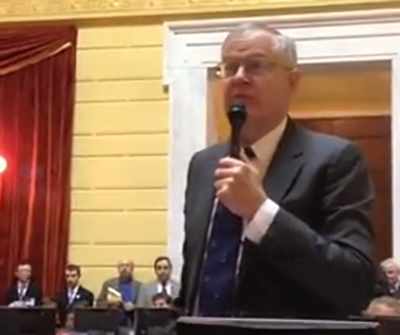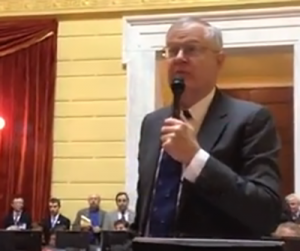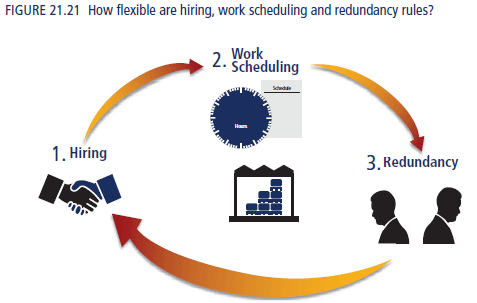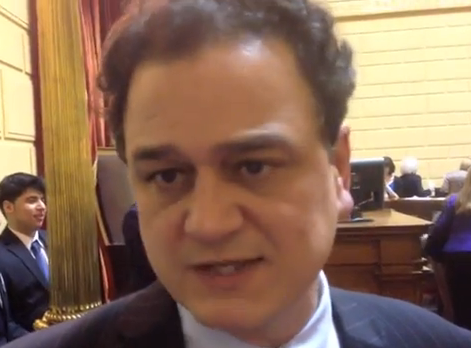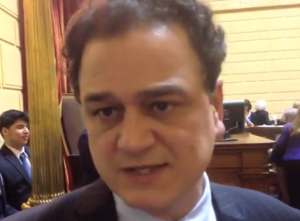 Mr. Speaker, Madam President, members of the General Assembly, fellow General Officers, members of the Judiciary, distinguished guests, and my fellow Rhode Islanders.
Mr. Speaker, Madam President, members of the General Assembly, fellow General Officers, members of the Judiciary, distinguished guests, and my fellow Rhode Islanders.
It is a pleasure to join with you tonight in this chamber in this remarkable building, which for more than a century has served as a forum for the democratic debate that fosters our unique and very lively experiment.
It continues to be a privilege to serve the people of the great State of Rhode Island. Three years ago, when I was sworn in as Governor, I said that if we were willing to take on the hard work necessary to correct our course, we could lay the foundation for a new era of opportunity for Rhode Island. I am more determined than ever to honor that pledge – to affirm the trust the public has placed in us by making the right decisions to position our state for long-term prosperity.
I stand here today mindful of our challenges, but also hopeful for the future, and proud of the positive steps we have already taken.
I am proud that we are making Rhode Island a better place to live, work, and raise a family. We have increased funding for public education at all levels. We have taken steps to preserve and protect our environment and reduce the harmful effects of climate change. And, we have successfully launched HealthSource RI, the state health care exchange.
I am proud that we are identifying problems and finding ways to solve them. The DOT is no longer borrowing to fund basic transportation projects. We have dramatically reduced wait times at the DMV. And we have brought Central Falls out of bankruptcy to a new era of fresh leadership.
I am proud that we are living up to our state’s long legacy of diversity and tolerance. We have rescinded the divisive E-Verify law. We have given to all qualified Rhode Island students the opportunity to receive in-state tuition. And, we have extended the freedom to marry to all loving Rhode Island couples.
Rhode Island is steadily moving forward, but as you know, too many of our citizens are still struggling, and we have much more work to do. With that in mind, tonight I respectfully submit to you my fourth state budget and recommended bond issues that invest in our state’s future.
I am pleased to submit this budget to you on time– for the second year in a row. We are always looking for ways to become more economically competitive, and once again, this budget contains no broad-based tax increases.
I am also very proud of our team of directors and dedicated state employees who helped make difficult decisions. As Governor, I have been committed to spending taxpayer dollars wisely, and our talented team of directors deserves great credit for once again spending less than their enacted budget. I am also particularly gratified that the state has ended each year that I have been Governor with a healthy surplus.
Many of you know by now that I like to be consistent in my priorities. As with previous years, this budget invests in public education, infrastructure, and workforce development while also continuing to support our cities and towns and our local property taxpayers. I believe this is the right recipe for lasting growth and success for Rhode Island.
Recently, we marked the 50th anniversary of President Johnson’s “War on Poverty”, a key component of his Great Society. This is a milestone which prompts us to reflect on our collective progress on this front – both as a state and as a nation. While we would all agree that this is a war worth fighting, I don’t think any of us could say it’s a war we’ve won. On the contrary, I strongly agree with Pope Francis, President Obama, and other leaders who have expressed alarm at the widening disparity of opportunity in our communities.
It seems as though the battleground in the “War on Poverty” is increasingly the fundamental question of whether the government has a role to play in helping Americans help themselves out of poverty and up into the middle class. To that question, I answer an unequivocal: yes, government can be a force of good in people’s lives.
Unfortunately, the Tea Party and so-called conservatives have waged a war of their own on beneficial social programs that have proven to grow our essential middle class. Meanwhile our national economy sputters and the wealth disparity grows larger.
The struggle for equal opportunity for all isn’t just fought at the World Bank or in Washington, but in State Houses across the country, as well. We in this chamber have the responsibility to address it here in Rhode Island.
Education has always been the great equalizer. No matter where you start, if you get access to a good education and work hard, you can succeed. As President Johnson put it in his “Great Society” speech of 1964, “Poverty must not be a bar to learning, and learning must offer an escape from poverty.”
Each year that I have been Governor I have made public education a priority, and that continues tonight. I propose an additional 38 million dollars to continue to accelerate Rhode Island’s K through12 funding formula. Thank you for your past support of this initiative and let’s keep it going.
I have also worked with our three college presidents and have included an additional 10 million dollars in the budget to ensure a second year of tuition freezes at URI, RIC, and CCRI.
If you accept the funding levels I have proposed, we will have dedicated an additional 189.8 million dollars to public education in Rhode Island over my four budgets. There is no better or smarter investment we can make. It will pay dividends and help close an equality gap that threatens our future.
My budgets have been a course correction from the deep cuts imposed by the previous administration toward public education.
The State of the State offers an opportunity not only to reflect on the year behind us, but also to look ahead. This past year, through our Sustainable Communities initiative and a 1.9 million dollar federal grant, we commissioned several studies to do just that: to look at what we can expect from the years and decades to come, and how best to prepare.
And here’s what one of those studies – PolicyLink’s An Equity Profile of Rhode Island – tells us.
- That the face of Rhode Island is changing. We are becoming an increasingly diverse state, and our economy is changing in turn. Consider that:
- Rhode Island’s share of people of color increased from 7 percent to 24 percent between 1980 and 2010.
- That all of our state’s recent population growth is attributable to people of color, who will continue to drive growth for the foreseeable future.
- That by 2040, 41 percent of Rhode Island’s residents will likely be people of color, with Latinos reaching more than a quarter of the total population.
- The study also says that communities of color are growing not just in our core cities, but throughout Rhode Island.
- And, that today, 36 percent of Rhode Island’s youth population is people of color, while only 9 percent of our seniors are. The gap quadrupled between 1980 and 2010.
This is the future of Rhode Island. And the best way to prepare for it and translate it into prosperity is to ensure that all Rhode Islanders have access to quality public education. We cannot afford to have disparity in Rhode Island where there are areas of opportunity and others where poverty and lack of education self-perpetuate and hold back our economy as a whole.It was proven by the Dorr Rebellion of 1841 and the Bloodless Revolution of 1935 that hardworking and determined immigrants could make Rhode Island a better place to live. If we can open the doors of opportunity to those who are driving growth in our state, it will be a bright future for all, not just for some. The PolicyLink Study also said regions that embrace equity and diversity experience greater economic success.
But learning doesn’t end with a high school diploma or college degree. At any stage of life, education can help give Rhode Islanders the skills they need to get back on the job quickly.
Even in these difficult economic times, there remain jobs open in Rhode Island that are going unfilled. We can do more as a government to close this “skills gap.” For the first time last year, I included in the budget state money to complement federal support for workforce development. This year, I propose continuing this targeted investment in workforce training and assistance programs to help our people get back to work and meet the needs of Rhode Island employers.
As I said earlier, our investment in infrastructure continues in this budget. But Rhode Island’s infrastructure is more than our roads and bridges.
We have made great strides at upgrading the campuses at our state colleges, and I propose to continue this necessary work. Renovations and new construction for URI’s College of Engineering are expensive but I wholeheartedly support placing a 125 million dollar bond issue to the voters for this project. This is an exciting addition to the new Biotech and Life Sciences, College of Pharmacy and Chemistry buildings already completed or under construction at URI.
Congestion and gridlock are becoming more commonplace throughout the state. Therefore, I propose a 40 million dollar bond be placed on the November ballot. These funds will be used to undertake major enhancements and renovations to mass transit hub systems at key locations in our state. To facilitate this work, I have included 250,000 dollars from the Rhode Island Capital Plan Fund for the preliminary design of this new hub strategy. As we all know, good mass transit will spur economic growth.
We are moving forward with the important runway expansion at T.F. Green, which will enhance and improve Rhode Island’s gateway to the country and the world. The thoughtful development of the 195 land in the heart of Providence also continues, with smart decisions by the members of the Commission. And we recently announced exciting news at one of Rhode Island’s great success stories, Quonset Point, where General Dynamics Electric Boat signed a new 25-year lease agreement to expand its footprint and bring more good-paying jobs to our state.
Here in Rhode Island, our spectacular natural environment is among our most precious resources. My administration has therefore made and will continue to make investments to protect and responsibly use some of our state’s most beloved natural assets. In this year’s budget, I have proposed a 75 million dollar environmental bond question to be put before the voters. These funds would support improvements to vital DEM programs, such as brownfield remediation and land and open space acquisition. They would also provide additional resources to municipalities to improve our water and wastewater systems.
Since our founding, Rhode Island’s identity and economy have always been tied to the sea. We enjoy it and we depend on it, and my administration has been committed to the protection of our renowned coastline and ocean access points that draw tourists from around the world. Building on the success of the 2012 America’s Cup World Series in Newport, my proposed budget includes 10 million dollars to create an event center at Fort Adams State Park. This facility will allow Rhode Island to host large-scale, world- class sailing events, such as the America’s Cup, the Extreme Sailing Championship, and the Volvo Ocean Race, which will have its only North American stopover in Newport in 2015.
One of Rhode Island’s premier assets is our long and rich history, evidenced by the many special buildings found across our state. I was pleased last year that we reopened the historic tax credit program, putting nearly 35 million dollars back to work to help create jobs for Rhode Islanders. However, the demand for tax credits has far outpaced what was made available. Therefore, I propose providing access to an additional 50 million dollars in historic tax credits.
These are important investments, but getting the economy going requires more than repairing our bricks and mortar. It requires strategically deploying resources toward carefully selected segments of the state’s economy. Last year, you in the General Assembly enacted legislation exempting certain works of art from the statewide sales tax. This is an exciting step toward making Rhode Island the true “State of the Arts.” To build on this momentum and support our arts, culture, and historic assets, I am calling upon Rhode Islanders to make a 35 million dollar commitment through a bond referendum to move this critical segment of our economy forward.
For those who still do not recognize the connection between the vibrancy of our arts and culture and the strength of our economy, consider these facts:
- A national study released last month estimated the creative sector’s contributions to the national gross domestic product at over 500 billion dollars annually – or at least 3.2 percent of the entire GDP.
- Here in Rhode Island, another recent study reported that in one year alone the state’s 1,163 arts and cultural organizations created 5,200 jobs and over 324 million dollars in economic activity. For a small state such as ours, that is a big contribution.
Therefore, in addition to the bond item, I have proposed 1 million dollars in general revenue in support of the arts. I also recommend the establishment of a new Creative and Cultural Director at the Rhode Island Commerce Corporation, modeled after similar recent moves by Massachusetts and Vermont. I also recommend moving the Rhode Island State Council on the Arts and the state Film Office to the Commerce Corporation to synergize and enliven the state’s creative apparatus. The Commerce Corporation will now be a valuable tool for organizing customized programs for the arts, design shops, historic sites and intellectual property producers, all of which drive so much of our economy.As I mentioned earlier, our state is growing more diverse with each passing day. In addition to operating honestly and effectively for Rhode Island taxpayers, our government should reflect the diversity of the population of our state. With that in mind, building on the Executive Order on Diversity I signed last year, I recommend the creation of a new Executive Division dedicated to diversity. I look forward to a strong proactive approach to these efforts.
I also see an opportunity in the near future to change the tax climate in Rhode Island. I and the Congressional Delegation have lobbied in recent years for passage of the federal Marketplace Fairness Act. This would level the playing field between bricks-and- mortar and online retailers by allowing each state to collect sales and use taxes from sellers with no physical presence in the state.
After a series of encouraging signs, including 69-27 passage by the U.S. Senate last May, I now urge the House to take action on this important legislation.
While current Rhode Island law dictates that should Marketplace Fairness Act pass, the state sales tax would be reduced from 7.0 to 6.5 percent, I believe that there are more effective ways to use the resulting revenues to increase our relative competitiveness. Should the legislation pass, my proposed budget calls for reducing the corporate tax rate to 6.0 percent consistent with my goals in previous budgets. I also propose to eliminate the sales tax on electricity and gas for all businesses. While the New
England Governors recently proposed a comprehensive energy strategy to prepare for the years to come, this does not help us today. The reality is that commercial energy rates continue to rise, as evidenced by the recent 23.2 percent increase here in Rhode Island.
My budget also reserves some funds in anticipation of competition from Massachusetts casinos in the coming years, which will adversely affect our revenues.
One more word on Marketplace Fairness: if it does pass, we won’t be the only state to realize a windfall. Others, including Massachusetts and Connecticut, will also gain a new revenue stream, and they will likely use it to make their tax structures more competitive. They’ll have the discipline, and Rhode Island cannot afford to be the outlier. The temptation to spend the money on short-term fixes will be there, but we have to resist it and put those resources toward the long-term competitiveness of the state.
And good tax structure is only part of the equation of encouraging business growth in our state.
New England is facing serious challenges in the energy sector. The first is cost – we have some of the highest in the country because we are at the end of the pipeline. The second is climate change. We know it is happening and humans are causing it with emissions from burning high carbon fossil fuels. That is why I am working with the other five New England governors and five Eastern Canadian Premiers to achieve collectively what no single state or province can accomplish on its own – to build out our transmission lines and pipelines – so we can tap into clean, affordable and reliable hydropower, clean wind and solar power, as well as ensuring that we have adequate natural gas to contain our electric costs. I personally have visited the vast hydroelectric facilities in Quebec and Labrador. We do have the potential to make this region the low- cost green energy capital of North America.
Finally, I would like to discuss the status of Rhode Island’s ongoing economic recovery.
By nearly every measure, Rhode Island is on the upswing. The last employment report, showed all of the factors examined – unemployment rate, unemployed residents, employed residents, labor force, and Rhode Island-based jobs – moving in the right direction. Since I took office in January 2011, we have created 11,100 Rhode Island- based jobs.
Yet I know that this is not enough. Too many of our citizens are still unable to find work, and too many of our young people have left Rhode Island. Our social safety net continues to need mending. And, our programs to help Veterans can always be strengthened.
As a U.S. Senator, I opposed the Bush economic policies because I knew they had the potential to cause a devastating collapse. And, they did. And now the national recovery has been too slow, but we are moving in the right direction. Rhode Island was hit harder than almost any state; it will therefore take time to crawl back out of the hole. But the most damaging mistake we could make is neglecting the fundamentals of a strong economy – quality, affordable public education, sound, forward-looking infrastructure projects, and worker training and development initiatives. This is how we will build a sustainable economy that will benefit all Rhode Islanders without leaving behind those who are struggling the most. And we must not repeat the sins of the recent past and shift the burden to our cities and towns and our already overburdened property taxpayers.
There is no question that this has been a difficult period for Rhode Island, but we are poised to emerge from it more resilient than before. Rhode Island is getting stronger with each day, each week, and each year – that is the state of our state. And if we continue to follow a steady, deliberate, compassionate course, avoiding short-term decisions and quick fixes, the coming year will once again be better than the last.
Your job as legislators is to make laws; my job is to oversee the efficient operation of state government. There are so many good people working for the State of Rhode Island, and I, for one, am very proud to be a “state worker.”
In closing, I would like to quote someone who may surprise you. Not Roger Williams, but rather one of our more recent arrivals, Taylor Swift of Westerly. When asked about her new part-time home state, she had this to say: “I’ve been in Rhode Island a lot … Man, Rhode Island’s a good place. It’s a really good place.”
Thank you.


